Meet New York's Most Miserable Priest!
Plus! A Krazy Kat Story!! A Very Snazzy Laundryroom!!!
Hello everyone,
Welcome to Issue #75 of CAFÉ ANNE!
HUGE NEWS!!! Following a three-month renovation, the laundryroom in my Brooklyn Heights apartment building has finally reopened—with seven washing machines and seven dryers—that’s two more of each than before!
It’s the talk of the elevators. Everyone in the building is gushing over the speedy wash times and credit card payment system. There’s even an app that can tell you whether there’s an available machine or if Shelly in 6F is hogging all the dryers again.*
Of particular interest are the laundry carts which feature curved sides that fit precisely under the washing machine openings. “It’s like a Wes Anderson scene,” one neighbor observed. “So beautiful, and perfectly symmetrical!”
In other news, I am looking to write about a business that pays everyone who works there the same salary or wage. It doesn’t have to be in NYC, and could be large or small. Please let me know of any leads: annekadet@yahoo.com.
I am very excited about this week’s issue, of course. I’ve got an account of what happened when I called the number on a strange sign posted on a telephone pole. Also, so that I could take a little break this week, I’m re-rerunning one of my favorite stories, a feature I wrote in February 2022. This was back when CAFÉ ANNE had just 800 readers, so 6,000 of you never saw it! Please enjoy “New York’s Most Miserable Priest,” below.
Regards!
Anne
*Kidding! Shelly in 6F is the best neighbor I ever had.
CITY WATCH
Available Now! Sixty Cats!
After I devoted Issue 72 to lost pet posters, reader Dan K. in Sunnyside, Queens sent a photo of a sign he’d spotted recently that was very much lost-pet adjacent:
In case you can’t quite make it out, the sign says, “In a cople of yers some 4 cat’s will be on sale.” Below that are two phone numbers. Below that it says, “I am JUSt a Kid.”
I called the first number. A man answered the phone.
“Hello?” he said.
“Hello!” I said, “I saw your sign about cats for sale?”
“No,” he said.
“Cats for sale?”
“I’m sorry,” he said, “I only speak Spanish.”
I pulled up Google Translate.
“Gato en venta?” I asked. “Vi tu senal gato en venta?”
“No,” he said. “No, no, no.”
“Okay,” I said. “Thank you!”
I next tried the second number, which I guessed was the kid’s mom. Sure enough, a woman answered the phone.
“Hello, I’m calling about the cats for sale,” I said.
“Could you speak Spanish?” she asked.
I tried the same Spanish phrase I had used for the fellow. I guess my pronunciation is terrible because she asked me to text her instead.
“Hello!” I texted in Spanish, relying on the translation app. “I just called you because I saw a sign that I think may have been posted by your child. It said, ‘In a couple of years some four cats will be for sale.’ It also said, ‘I am just a kid.’ Do you know about this? I thought it was very cute!”
She texted right back, in Spanish: “Yes, that’s my daughter. My friend has many cats in her house. There are more than 50 cats!”
The sign was written hastily, she said. She and her seven-year-old daughter, Marcarena, are actually trying to give the cats away. Their friend Connie, who is 83, has 30 cats living in her house and another 30 living in the back garden.
The mom, whose name is Gaby, sent me a photo of her daughter hanging signs:
They started posting the signs around their neighborhood two months ago and they’ve gotten many calls. So far, she said, they’ve been able to place 17 kittens and cats!
I asked Gaby if I should let my readers know the cats are available for adoption. “Oh, super!” she replied.
The cats are all healthy and well cared for, she added. “They eat the best food.”
So if you’re looking to adopt a kitty with a really good back story, drop me a line and I’ll hook you up: annekadet@yahoo.com.
FEATURE
NYC’s Most Miserable Priest
When I met Father Mike Lopez at his food pantry last week, he was in a great mood. The parish hall operation was in full swing as 20-odd volunteers—including his deaf aunt and the crew of homeless men who stay at his shelter—packed 1,800 bags of groceries for local families.
Having recently celebrated his 39th birthday at the Queens cigar bar Havana Dreams, the heavy-set priest, who has been drinking roughly a bottle of rum a day since the start of Covid, was also excited about his new goal—reaching his next birthday in the best shape of his life. He’d already made it three days without a drink and was 36 hours into his new all-potato diet.
“I feel energized!” he said.
We settled into his office off the noisy parish hall, crowded with framed prints of favorite saints, candles, storage cartons, and a box of Monte Cristo cigars.
“The space was much nicer when we opened,” he said, surveying the clutter. “This s— shows up every f—ing place. Booze everywhere, Lysol and Listerine. I have a drawer full of condoms here…” (They’re a donation from a clinic!)
I’d wanted to interview Father Mike since we first met a year ago. And it wasn’t just because he’d recently founded a new Queens parish and monastery, four homeless shelters and a pantry serving 3,000 families—while working as a gun-toting criminal investigator for the federal courts.
It was his philosophy that struck me. “I’ve learned in my spiritual walk that no expectations is the way to accomplish everything in the world,” he’d said.
Who was this guy who had accomplished so much by expecting nothing? I suggested we start at the beginning, and wasn’t disappointed. His life story started off very, very normal. And then it got very, very weird.
Bushwick was a rough neighborhood in the 1980s, said Father Mike, but he felt safe growing up. His dad, who is from Puerto Rico, delivered ice cream to local groceries. “He’d come home on a summer Friday and bring big piles of cash,” Father Mike recalled.
He went to parochial school and became an altar boy. “It felt like an honor, like an otherworldly, mystical experience,” he said of his service.
He was a good kid who followed the rules. “In high school, I would date girls, but I'd be like, “We can't f—because I'm gonna be a priest,’” he recalled.
He studied philosophy and criminal justice at St. John’s University in Queens before enrolling in seminary. Then he was sent to live in a Catholic parish in Bed-Stuy. That experience changed everything.
Father Mike saw priests as dignified, holy men whose main responsibility was the Sunday sermon.
The Bed-Stuy church was a totally different scene—a Black and Latino parish led by priests who devoted themselves to service 24/7. “They would dance at the parties with the people,” said Father Mike. “They had a food pantry. They had a soup kitchen. They had a clothing thrift store, you name it. They had ESL classes, GED classes, HIV education programs. You know, it was just full of life.”
He developed a new take on Jesus.
“You know, the poor are forgotten, but in the Gospel, Jesus talks about the poor more than any f—ing thing,” he said. “He talks constantly about the poor. The poor, and people that are different from you. I don’t know how the Church got so lost.”
At Father Mike’s All Saints church, all comers get food and shelter, no questions asked. “If everyone tended a small patch in New York, the city of churches—if every little church had a pantry—we could just take care of everybody,” he said. “We wouldn’t have all these meltdowns.”
I asked him to summarize himself in one line—as New York City’s most something priest. Father Mike shook his head. “Maybe I’d call myself the priest of the poor?” he said. “I don’t know. I can’t even touch that.”
Father Mike’s time at the Bed-Stuy church also exposed him to the dark side of the priesthood. Living with a community of fathers, he saw them holed up in their rooms smoking three packs a day, cursing parishioners behind their backs and throwing tantrums when a seminarian, say, failed to properly dispose of a napkin. Then came the disclosure of several child sex abuse cases.
Already questioning his vocation, he fell in love with a woman he met in the parish. He left the seminary and, with the church’s blessing, got married.
“We did it the right way,” he said. “I was leaving the priesthood, but marriage is also a sacrament.”
He envisioned a bright future. “We’re not going to be like our parents, we’re not going to fight, we’re not going to do drugs,” he vowed. “We’re educated. We’re going to be good, be successful. I’m still going to be a deacon or minister on the side—be a youth minister every Sunday.”
But he wasn’t prepared for marriage. “We spoke to each other like our parents spoke to each other,” he said. “Very rough. We loved each other very much, but it was very rough. A lot of anger, and we didn’t have the resources to figure it out.”
His wife left within a year. “That’s when I started learning. When I started growing up,” said Father Mike.
He had a mini breakdown and went to a priest for help. The priest told him that God was punishing him for getting a divorce. That was the last straw. “I was like, ‘F— the church,’” he said.
He opened a cigar bar and worked as a court investigator, interrogating suspects and witnesses. His first case involved a pimp accused of sex trafficking and infanticide. The job, from which he recently retired, taught him that any person is capable of anything, he said—himself included.
In his late 20s, he met another woman, got married and had two kids. He is, in fact, very much a family man.
Father Mike must have noticed my eyes bugging out of my head at this point. “You didn’t know I was married?” he said.
Following his break with the church, Father Mike set religion aside for years. Then a friend who wanted to get married in the Catholic Church but was refused asked Father Mike to officiate. “Just show up, dressed like a priest,” the friend begged. “Make my family happy!”
Father Mike got ordained online with the Universal Life Church, showed up in a collar and performed the ceremony. He was gratified by the response. “Everybody's like ‘Father, oh my God, your homily was so great. Where's your church?’” he recalled.
He felt a little guilty for impersonating a priest, and worried about going to hell. “But these people got what they wanted, and everybody’s happy,” he said. “Is God not manifest and present in a fake priest as much as a real priest? I would say so because I think the authority comes from the people, not from the organization. All those people authorized me to be their priest that day. I’m their priest.”
“After that wedding, my vocation rushed back into my body,” he said.
Father Mike started exploring denominations with a Catholic flavor that would ordain a married man. The Episcopalian church was an obvious choice but didn’t feel right. “At the time, it was way too focused on women’s ordination and gay stuff,” he said. “I said, ‘Why can’t we just be a church that has those things but doesn’t have to talk about it all the time? Let’s talk about the Gospel. No one cares that you’re a woman saying Mass. No one cares that you’re gay. The only issue we can be all about as Christians is the poor. That’s what we need to push down people’s throats.’”
He finally learned of the Old Catholics, a denomination founded in 1879 when it disputed the Roman Catholic Church’s new embrace of Papal Infallibility.
The sect, which has roughly a million U.S. adherents, ordained Father Mike in 2017.
Aside from his social service organization, Monkworx—a largely volunteer-run network providing 61 shelter beds and groceries for thousands of families—Father Miked serves as the prior for a newly-formed community of monks and nuns who serve the poor, and delivers homilies every Sunday to a small parish.
He always talks about the poor in his sermons, he said, but Mass is less important than the buffet breakfast that follows.
“That really builds community more than just going to Mass,” he says. “We celebrate people's birthdays. We have sacraments. We tell families, ‘Don't rent the restaurant, have the party here.’ So everybody in the parish knows each other.”
Healing, he believes, comes from the community. Heaven is not some after-life reward, it’s a hug in the parish hall. Everyone on this planet needs a respite from their suffering.
“It’s always miserable,” he said. “The rich are miserable. The poor are miserable. When you have a girlfriend, you want to be single. When you’re single, you want a girlfriend. In the winter, you want to be hot. In the summer, you want to be cool. That’s misery. We’re a miserable f—ing creation, if you’re honest. A baby is born and starts f—ing crying the minute it comes out.”
“Am I miserable most of the time?” he continued. “Yes, I am! I’m mostly miserable. You can put that. ‘New York City’s Most Miserable Priest.’”
Father Mike seems pretty happy to me. I asked him to elaborate on an idea he’d mentioned earlier: “The shortcut to living your best life is to give it away to others.”
“Do you really think that’s true for everybody?” I asked.
“I would argue that it is factual,” he said. “I've seen healing here by these people working here. I've seen a trans kid who hates everybody in the world come to life here, and I'm sure it had to do with the fact he was giving of himself in a place where he was allowed to be who he was.”
“Start working for something outside of yourself. Not for business, not for reward,” he said. “Start volunteering somewhere that has to do with the poor, or the infirm, or the imprisoned, or the hungry. On a very basic level, it takes you out of yourself. And inside of yourself is where all the shit is. It’s not outside of you, it’s inside you. It’s only outside of you when you’re projecting it. Right?”
Serving the poor isn’t easy, he accedes, especially when it comes to the street homeless. There’s one regular at his parish, a bipolar, schizophrenic 67-year-old who shows up cursing, poops her pants and picks at the ulcers on her feet. But Father Mike has learned how to soothe her, and she’s welcome too.
“As humble as I try to be about saying this is not rewarding, at the end of the day, this is rewarding work,” he said. “It feels good to help someone else feel good or be less in pain. No matter how much you try to play that that’s not why I do it, it just exists. It feels good. So if you’re honest about it, it’s okay.”
CAFÉ ANNE is a free weekly newsletter created by Brooklyn journalist Anne Kadet. Subscribe to get the latest issue every Monday!


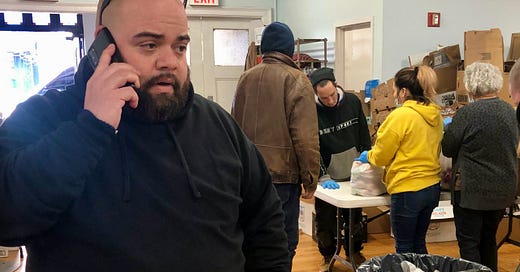



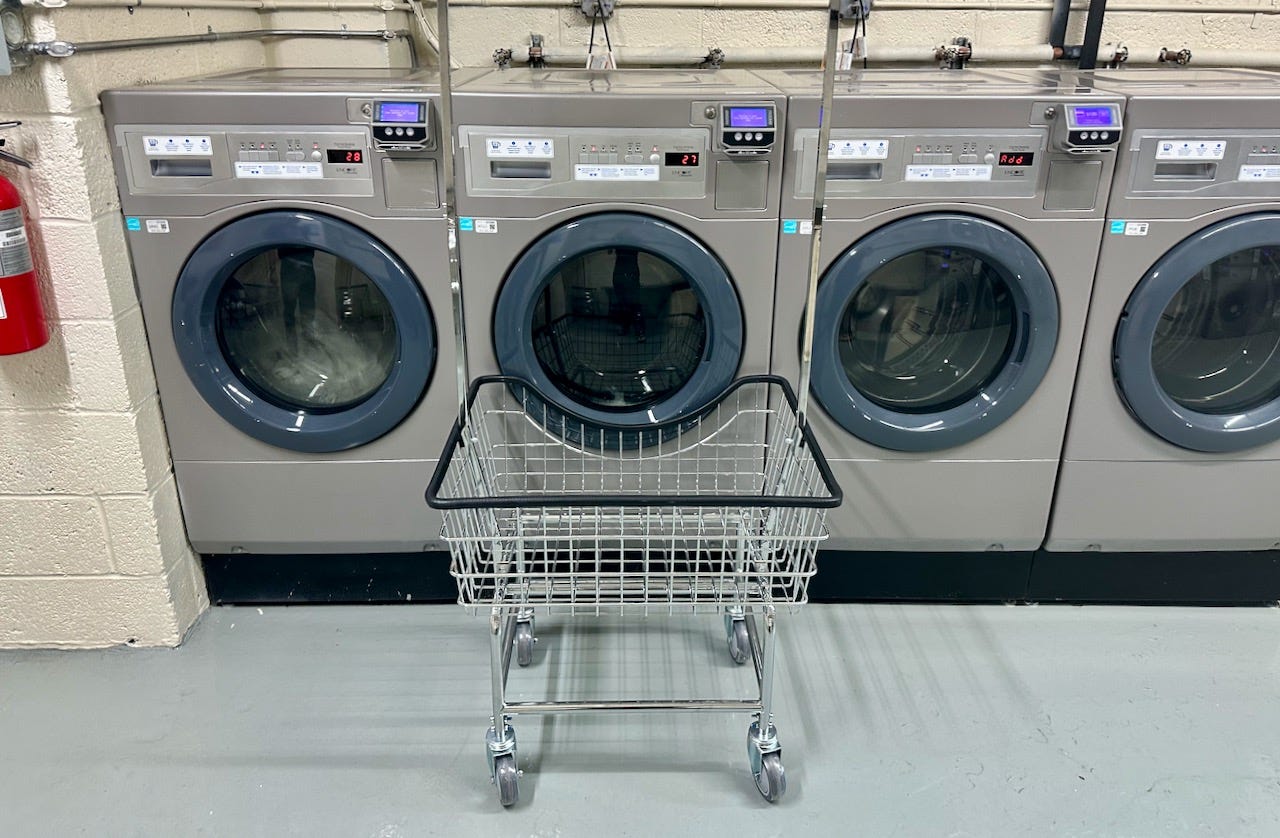

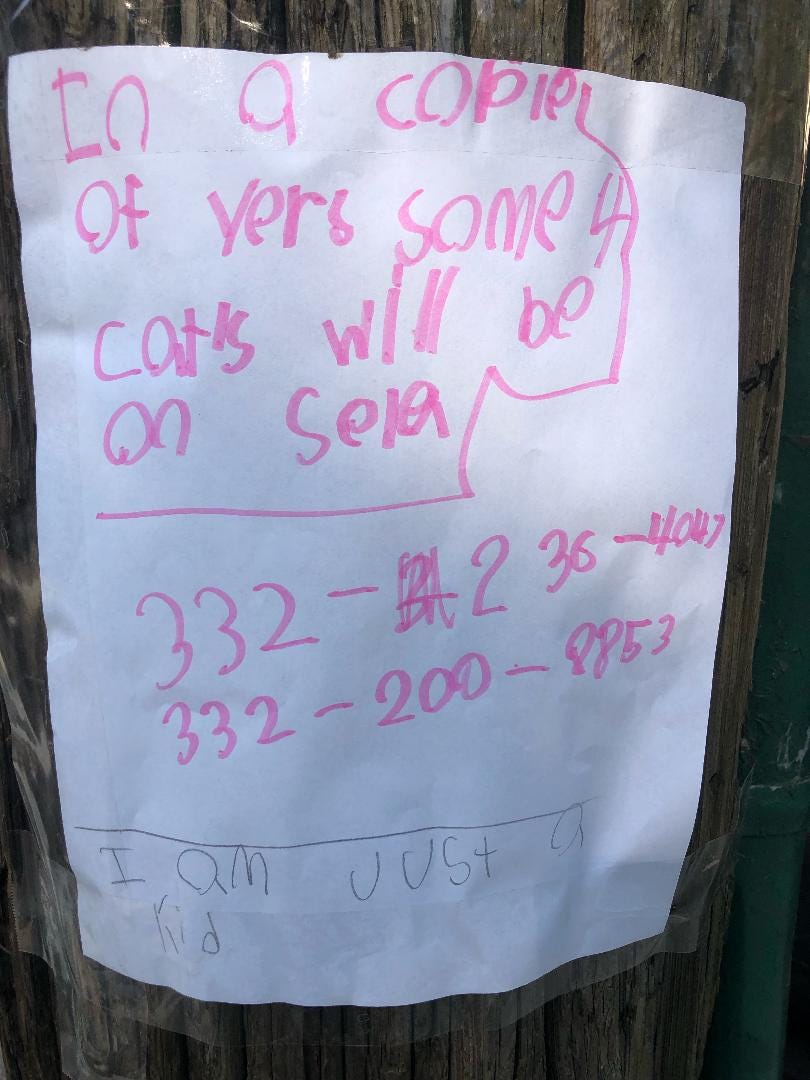
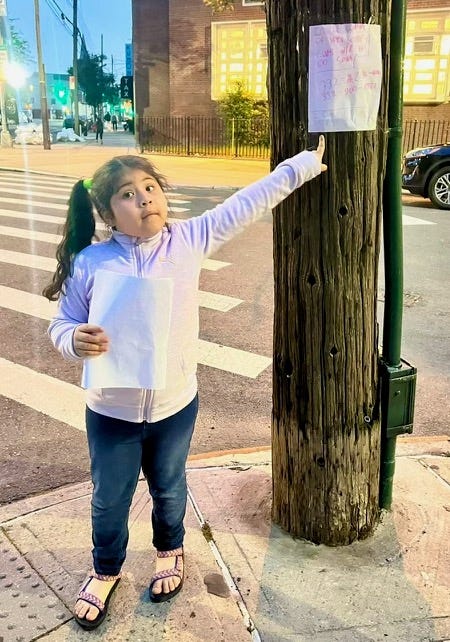




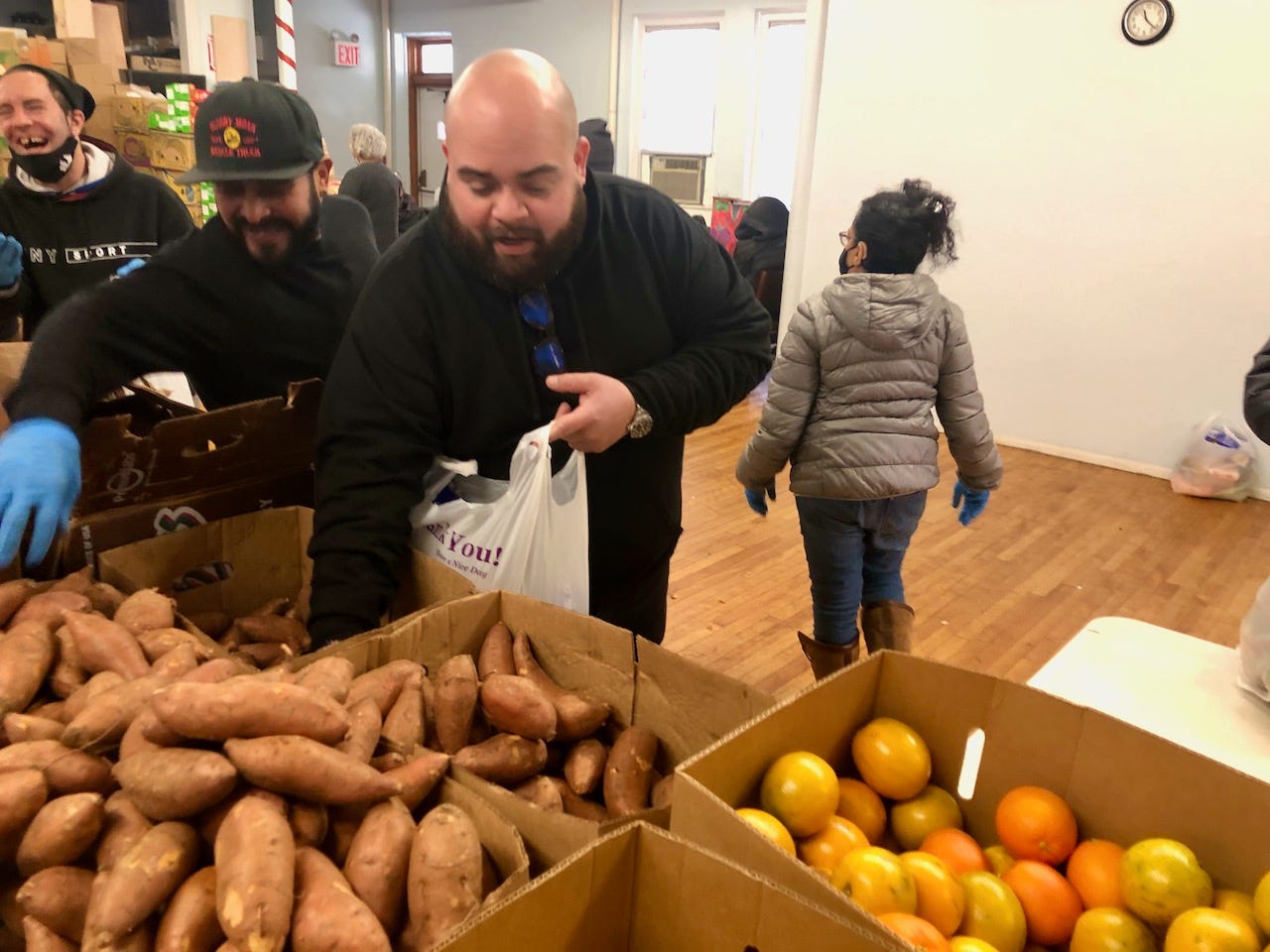



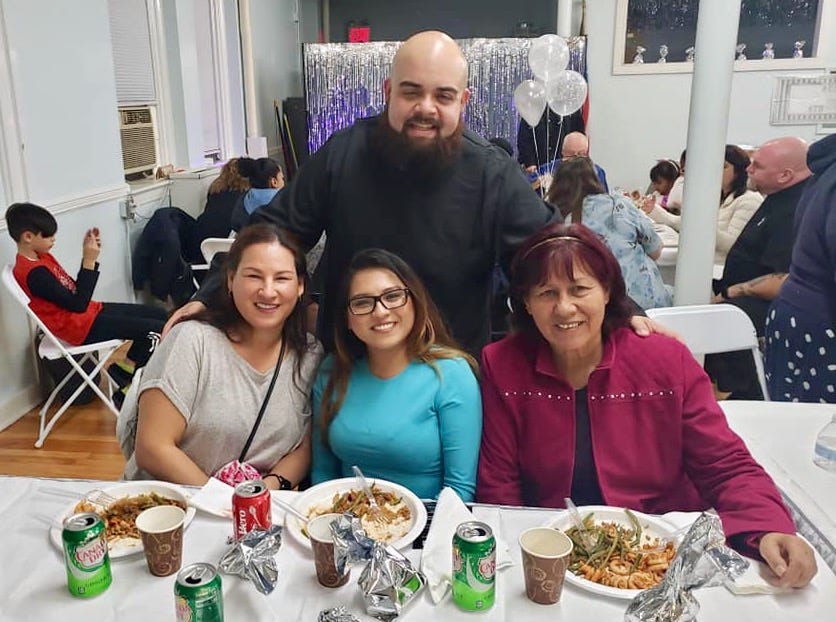

Re: "New York's Most Miserable Priest!" What a great profile of a fascinating man. Fr. Mike Lopez is the complex, scarred individual we all are to some degree and he has found a way to turn his experiences into compassionate support for the poor and created warmth and happiness. He is so right, that the Gospel does talk about the poor more than anything. I know many Catholics who would also agree with his approach, but find it hard to fight with the traditionalists. This line says it all: "Mass is less important than the buffet breakfast that follows." Thanks, Anne, for telling us about Fr. Mike. Your eye for detail and your curiosity in people without judgment shines through in your writing.
Laundry room! Cats! Miserable, AMAZING priest! Anne, you’ve covered humanity in all its forms today as every Monday. Post perfection - another incredible read. 😊😊😊